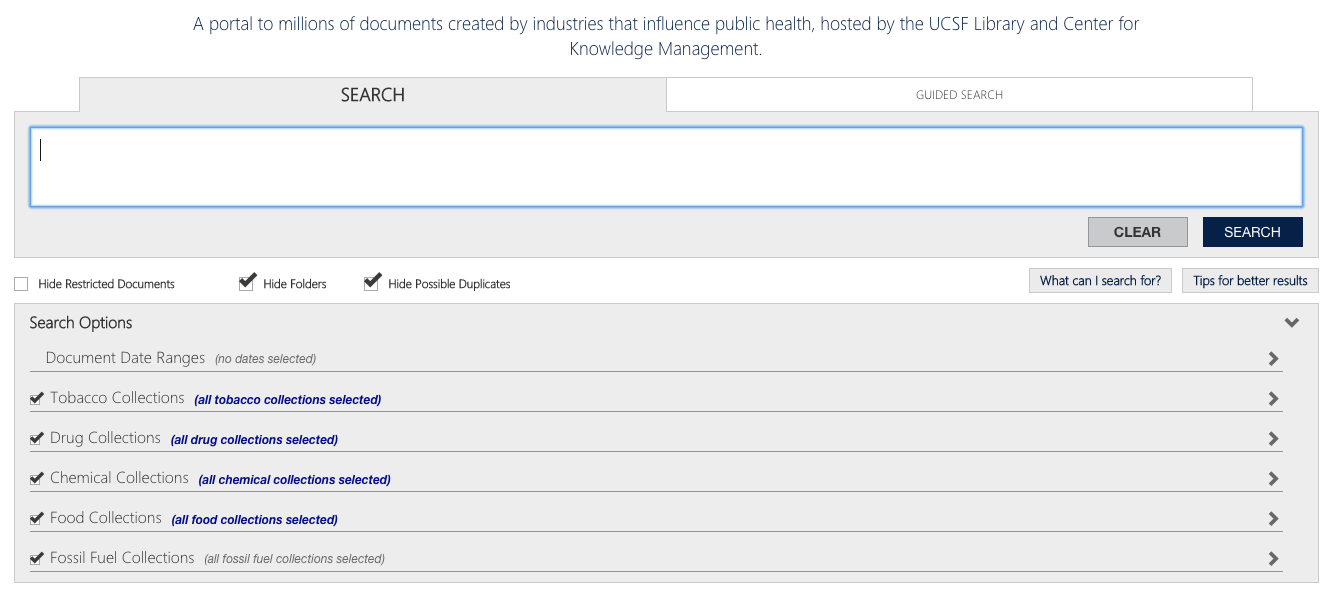Today, UCSF Library launched a new Fossil Fuel Industry Documents Archive featuring over 1,000 internal documents from the fossil fuel industry illustrating strategies to cast doubt on climate science and delay policy action. The documents were collected over two decades by the Climate Investigations Center.
UC San Francisco‘s Industry Documents Library (IDL) is a unique resource. It gathers and organizes internal documents from companies that privatize profits and socialize costs, risks or damage to health or environment.
Real science is often inconvenient for profits, so such companies spend money on politics, disinformation, doubt-creation and attacks on science and scientists, sometimes via “independent” think tanks or front groups often covered here on DeSmog.
UCSF has gotten tobacco documents for decades, but over the last few years has added Drug, Chemical and Food sections to the archive as well. Internal documents from lawsuits, whistleblowers and other sources can be quite valuable for exposing malfeasance, helping community action, backing legislation and supporting lawsuits. It is incredibly helpful to have one database of well-curated documents from multiple industries, as they use similar tactics often employed by some of the same people and organizations, as illustrated by personal experience below.
I got interested in the fossil-tobacco connection on hearing a 2007 talk by Naomi Oreskes, and later reviewing drafts of Merchants of Doubt(2010) by her and Erik Conway. When I wrote Crescendo to Climategate Cacophony(2010), the focus was the fossil disinformation industry, but I found 12 relevant references to UCSF Library tobacco documents on general tactics and specifics like Heartland Institute, Fred Singer, Steve Milloy and TASSC, Many climate denial organizations also took money from Big Tobacco, although I usually did not know how much.
Fake science, fakexperts, funny finances, free of tax 2 (2012) explored the actions and finances of the Heartland Institute in much more detail. In trying to find its money sources, I saw that its Board included Philip Morris executive Roy Marden, so I searched the Library for him. I was ecstatic to find he was the one who doled out money to think tanks and that he created yearly spreadsheets 1991-2001, saving me an enormous amount of searching (pp.38-41). Many other internal documents also illustrated Heartland’s behavior. That report has 79 Library references.
After studying the Wegman Report and having academic misconduct reports stonewalled by George Mason University, I found not only a strong Koch influence, but likewise many tobacco connections, in See No Evil, Speak Little Truth, Break Rules, Blame Others (2012). Although not the main focus, 16 Library references were used.
Also in 2012, I was lucky to attend a small, intense, 2-day workshop that combined climate supporters and tobacco control people, We wanted to compare notes and for us (climate) to learn from tobacco control folks, who had longer experience, especially with legal battles. Again and again, they said “get the documents (and get them public)”, as that was really how lawsuit losses against Big Tobacco finally started to become wins. We are starting to see more lawsuits against fossil companies and I truly hope documents found in discovery will not be destroyed, but finally rest in a safe, easy-to-use permanent archive, such as the Library.
At that workshop, I first heard the UCSF research that showed the Tea Party had really been a joint effort of the Kochs and Big Tobacco, discussed in TEA Party: Tobacco Everywhere Always (2013). As with some of the earlier reports, the Library’s tobacco documents accidentally exposed actions of other people.
Some think tanks have long taken money from fossil and tobacco companies, often defending smoking. When major tobacco companies decided they had to get into e-cigarettes, views changed: Familiar Think Tanks Fight For E-cigarettes (2014).
Fossil industries sometimes hire tobacco operatives, as in Koch Industries Hires Tobacco Operative Steve Lombardo to Lead Communications and Marketing (2014). I’ve gotten in the habit of searching the Library for any new climate denialist name. Another was Richard Berman, in Richard Berman, Tobacco To Fossil Fuels (2014).
The US Chamber of Commerce has long fought efforts to regulate greenhouse gases, but also Thomas Donohue Sells US Chamber Of Commerce To Big Tobacco (2015).
Another climate denier had a tobacco connection: Ivar Giaever: Nobel Icon For Climate Deniers, and Philip Morris (2016).
Those are just a few examples of the value to journalism of well-curated documents and I hope for a flow of fossil documents over the next few years. Since 2013, I’ve been a member of the advisory committee for UCSF‘s Center for Tobacco Control Research and Education, tightly coupled to the Library, so I not only use the Library for my own research, but as the only computer technologist on the committee, follow the work and know the people. These folks do great work with a small staff.
It takes money to process the documents, and this work depends on grants that don’t necessarily fit usual health-related funding flows. So, Desmog readers, if you appreciate the Library, please consider a tax-deductible donation,as I have done, atop the time I spend at UCSF.
The Library is already a unique resource for exposing and helping counter corporate malfeasance against science, health and the environment, but I have great hopes its value will keep on growing.
Finally, as an exercise for the reader, search the Library’s tobacco section for Exxon. Why does that get 19K hits?
06/27/19 Update: For more context and examples, read Archiving the Anthropocene: Introducing UCSF’s Fossil Fuel Industry Documents by two researchers who know this topic well, Yogi Hale Hendlin and Naomi Oreskes.
Subscribe to our newsletter
Stay up to date with DeSmog news and alerts






